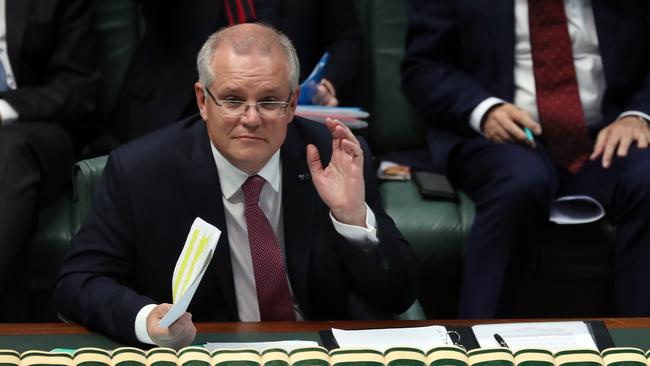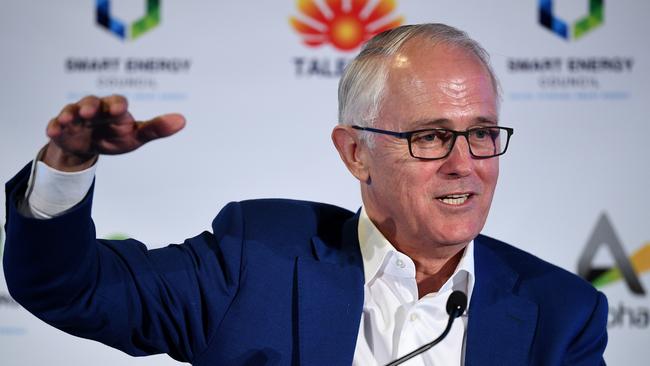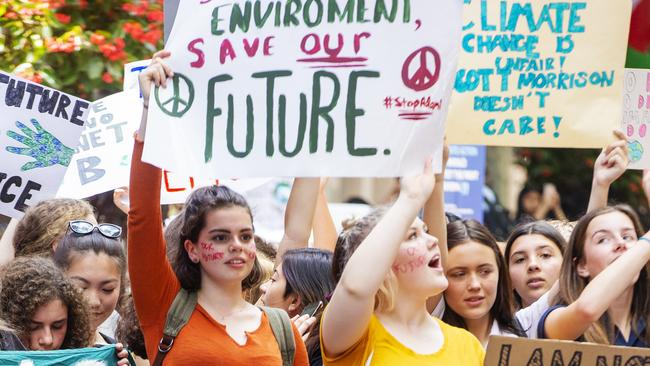Coalition needs to set aside emotion when setting policy
On border protection, Morrison is unassailable, but the fact neither party can talk sense to naive schoolkids is an indictment.

In this column last week I argued that “the rules must change” for the selection of the Liberal Party’s parliamentary leadership.
The proposal to give party members a vote on the leadership won’t be considered until after the election but it may have been made redundant by Scott Morrison’s two-thirds rule announced on Monday night.
The Prime Minister’s intervention was a simple, timely and convincing reform that will end the leadership churn, at least in government where it counts most. The deeper meaning here is the deliberate attempt to cut back on politicking in favour of governing.
This dismal decade has been characterised by the triumph of political games over real leadership, with Newspoll trumping stability and populism swamping rationality. In a week when Morrison’s predecessor was taking bitter, internal politicking to a new nadir, the Prime Minister was acting to guarantee leadership stability.
This change will provide some reassurance for voters at the next election — it just makes sense. The greater test for the Coalition is whether it can do much more to elevate governing and diminish politicking in what will be a volatile prelude to the May election.
It has always been a challenge for politicians to resist populism, ignore the media zeitgeist and focus on the right outcomes rather than polling trends or focus group reactions — after all, they always have to have a nose for winning votes.
But there is little doubt that the 24/7 political news cycle, digital immediacy and social media have elevated the degree of difficulty.
This must be part of the reason for the failures of the past decade. But given the antidote to these pressures is strong leadership, conviction and stability, they must have been missing too.
Climate change and border protection are two issues that have dominated national politics for more than a decade and have been particularly notable for the way emotionalism and politicking have overwhelmed rational approaches. We have seen this play out this week in a way that highlights the Coalition’s core strength, at least on borders.
The government has been suckered by the politics of climate change but remains stoically committed to a sensible approach on border protection, while Labor, once again, has shown its virtue-signalling weakness on the issue. It could be a pivotal moment.
Labor’s pretence at foot-printing the government’s tough and successful border protection regime has been exposed.
Led by attention-seeking independents and the Greens, it exposed its soft underbelly. Border protection has always been a potential weakness for Bill Shorten and a weighty policy concern for the nation but, especially under Malcolm Turnbull, the Coalition seemed squeamish about making this point.

Labor’s intervention this week, along with independents Kerryn Phelps and Tim Storer, the Greens and others, has exposed for all to see its desperation to parade its compassion by weakening border policies, thereby risking a return to chaos, trauma and tragedy.
To try to parade your compassion for children in detention when none are held in detention centres, only six are still confined to Nauru and you were the party that put more than 50,000 people including thousands of children into detention by rekindling an illegal people-smuggling trade that lured at least 1200 people to their deaths is the height of hypocrisy.
It is transparently about playing to the political Left, indulging in games to try to embarrass the government and looking for affirmation from the gallery and social media. It is not about serious policy implementation.
It is a classic case of politicking over substance; emotion over rationality.
Much of the media/political class (especially the ABC) have been wrong on this issue at every turn for almost two decades. They downplayed the people-smuggling problem, denounced measures aimed at stopping it, blamed the surge on push factors, spread lies about Australia’s treatment of refugees and even proclaimed that the dilemma could never be resolved.
The Coalition’s success has saved lives. It also has humiliated the critics who continue to misrepresent the issue and now have lured Labor into a policy push that can help very few, if any, refugees but could seriously undermine the strong border protection regime.
Australia always has provided excellent medical care to refugees while they have been held offshore and has evacuated people for additional care when required.
An ABC 7.30 item this week detailed how authorities examined arrangements to send refugees from Nauru to Port Moresby or Taiwan for medical attention. But the report didn’t make any mention of why authorities would prefer to do this rather than bring refugees to Australia.
Of the 494 people brought from Manus Island and Nauru to Australia for medical treatment, 460 remain here — they usually take the opportunity to appeal to our courts and remain. Medical transfers are used as a tactic to defeat the system. Despite its extensive coverage of refugee issues, the ABC tends to censor many of these relevant facts.
Any changes to laws or practices that indulge these tactics can only weaken the regime and therefore increase the risk of more chaos and tragedy unfolding in the future. Politicians need to display resolve rather than attempt to display their virtue.
Having stopped the boats as immigration minister, Morrison has enormous credibility on this issue and can highlight the risk of Labor. In the 2016 election the Turnbull campaign did nothing to warn of the risk Labor would pose on borders, or anything else.
Media coverage and activist campaigns about refugee issues are almost always ill-informed — deliberately or otherwise — and in Canberra reporters tend to focus almost entirely on the politics of the issue rather than the outcomes.
That campaigners, politicians and commentators can suggest that bringing refugees from offshore detention to resettle in Australia can be done without any downside shows an astonishing ignorance or disregard for what we have learned through the years.
Many commentators who echoed Labor’s claims a few years ago that asylum-seeker boats could not be turned back now endorse Labor’s new claim that all you need is turnbacks.
This is a level of gormlessness and reckless partisanship that is difficult to fathom.
On climate change, however, the idiocy is bipartisan. The rampant emotionalism characterised by thousands of schoolchildren taking to the streets to “save the planet” is not strongly countered with rational arguments by either major party.
The naivety of the students was unsurprising — especially given the diet of unbridled alarmism they are fed through schools, universities and media. Sadly, some politicians, parents and teachers applauded the abusive tone of the chants and placards.

Still, what about the facts? The students were demanding action on climate change and were cheered on by journalists, commentators and politicians for doing so.
Few, if any, were asked: what action? For what result? And at what cost?
The prospect that the Australian government could do anything that could change the global environment was too absurd to be entertained by adults, but there it was. They might have been better served and demonstrated a greater understanding if they took their protest to the Chinese embassy.
The latest climate summit in Poland has been told global emissions growth has moved beyond 2 per cent annually and will go close to 3 per cent next year. In other words, the annual global growth in carbon dioxide emissions is now about double Australia’s total emissions.
If we shut down this country entirely and abandoned our continent tomorrow, the minuscule reduction in global emissions would be usurped by emissions growth elsewhere within six months. Yet both major parties pretend that our costly climate measures deliver environmental benefits. They are kidding us.
No one seems to accept responsibility for explaining this reality to the protesting students or to voters.
No one dares call out the nonsense of calling for more action here when Australia is one of few countries that met its Kyoto targets and is committed to deliver real cuts under the Paris Agreement.
So when students call for “action” they mean they want additional action: on top of the Kyoto targets, Paris commitments, the renewable energy target, solar subsidies, battery subsidies, light globe laws, renewable energy grants, Snowy Hydro 2.0 and direction action projects. When they protest in the streets their teachers, parents and many politicians cheer them rather than inform them.
In interviews this week I asked a protester’s parent and Richard Denniss of green-left think tank the Australia Institute if they could name a country that was doing more on climate action at greater economic cost than Australia. Neither gave me an answer.
And the telling point is that all of this action — which has elevated our energy costs and contributed to job losses and economic dislocation — has delivered no environmental benefit because global emissions continue to rise substantially.
If the Coalition can derive a political benefit from eschewing emotionalism and sticking to the facts on border protection, perhaps it ought to attempt a similar approach on climate change and energy.
It should abandon the current competitive futility and openly advocate a cautious approach. Voters deserve facts over spin from someone.




To join the conversation, please log in. Don't have an account? Register
Join the conversation, you are commenting as Logout